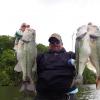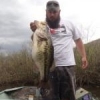My fishing (and hunting) journaling goes way back too -pretty close to continuous since the late 70's. I started with, and still use archive quality sketch books and ink pens. The few entries I did early on in ballpoint faded over time. I pretty much have done them like Will and A-Jay –“data” and "the story" in narrative form. Narrative includes my interpretations and explanations as well the how stuff It works well for me bc they help jumpstart rich and useful memories when I review entries prior to an outing. I now also write up some fishing days via word processer on the computer for posts, future articles, or mebbe a book or two (or more) someday.
The drawback to handwritten journals is that they can make it hard to find things after you’ve got more than a few volumes on the shelf. Back when I fished more I read them almost religiously -they were a part of my lexicon. I referred to them often and knew just where everything was -like a giant long narrative. Computer typed info is easier to search, but I still keep the hand written journals bc it would be a shame to stop. Nowadays, my hand written journaling contains more data, maps, and sketches, with short narrative. The fuller narratives are done on computer. I get the most out of my days in the field through this process.
I use photography, maps, and sketches too, I started with film cameras, my first bought with money earned from my trap-lines once upon a time. Photography, or at least the cameras, have come a long way since then. I've created maps with varying degrees of detail for lots of ponds, small lakes and reservoirs, and streams, using symbols, labels and captions to denote important things. Satellite views now make mapping a heck of a lot easier, at least in terms of big picture water body shape and relationship to the different areas I "know". Interesting that the shorelines in my memory maps rarely meet when I try to draw them! Says something about how biased and fragmented our navigational equipment, or at least memory of it, is. This is true in more ways than mapping I'm afraid.
The "data" I keep is mostly the numerical stuff (temp, visibility, depths, fish sizes), but also location, and weather descriptions and trends. I may print weather data in graphic form from weather data websites –you’ll see these in some of my trip reports here on BR. I keep track of critters seen -esp those that tell me something about timing, habitat, or food chain info I should be hip to. Examples might be ... when the blue damselflies emerge which concentrates the bluegills and bass, or when I see the first renovated crayfish burrows in the shallows in spring, or the relationship between the shad spawn and moon phase. I track the quality of the bass spawn by quantity of fry and fingerlings and other year classes observed, back calculating hatch year and forward calculating for expected growth. This helps tell me decide which waters I should be spending my precious time on. Along with this I try to keep tabs on winterjkill by making a circuit of my most vulnerable waters at ice-out. The two, year class popn size and winterkill allow me to keep a bead on which waters are apt to be most, and least, productive.
I also watch and talk with other anglers, as they can reveal a lot, if you know fish and fishing. There's LOTS of other ecological interaction stuff that can factor in. The trick is to recognize them, and keep track of them -this, over time, becomes an angling education. I realized long ago that I simply can't hold it all in my head.
I journal because I want to capture my experiences, but I realize that this is tied to what's most satisfying for me -being "in touch" with what's going on outdoors. There are definite patterns out there and they are cyclical: seasons, micro-seasons, to ever finer periods. This becomes more obvious after you’ve had a bunch under your belt, but it eventually builds into something unwieldy. It’s too big to hold in my mind. Yes, my body remembers quite a bit, if you know what I mean, but my head can help a lot, in re-directing my efforts or starting me on the right track to begin with. Although seasons are cyclical, no two waters or years set up or progress the same, which translates into the "moods" of each water body. There are too many seasonal micro-events worth remembering, things to be aware of, things to be watching out for -opportunities-"in's" I call them. I cannot keep track of them all. Glad I kept the journals up. Their value accrues over time.
Records have helped me be a better "noticer". If you've read any of my trip report posts you'll get an idea of the kind of info I glean and make use of, and how each day’s “story” is really part of a much larger, deeper, narrative.
Record keeping takes some work. I carry a small shirt pocket sized notebook and pen for maps and sketches and a pocket digital voice recorder for data, important thoughts and points. When I get home, no matter how tired, I try to journal, because I'll forget things and the resulting story ends up vague. Amazing how different my impressions can be AFTER the days pass.
Everyone approaches their fishing differently so you have to decide what works for you, and how much time and effort (and the type of time and effort) you want to put into it.




